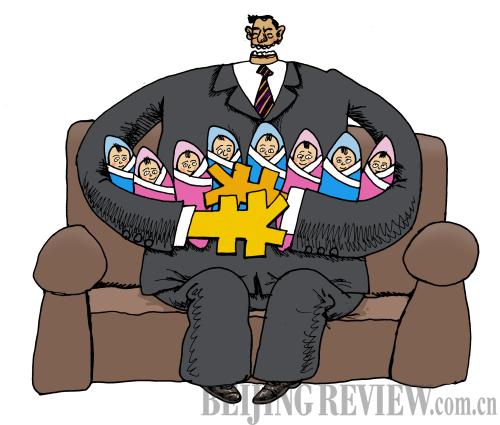|
 |
|
(CFP) |
With its soft pink background and the picture of a happy, healthy baby, at first sight, Ymdaiyun.com looks no different from any other website that caters to the needs of expecting mothers.
But the website doesn't sell nappies, or formula milk, strollers or any of the other products usually associated with motherhood. Rather a cursory skim of its text reveals that it is in fact a surrogacy intermediary website.
Surrogacy is an arrangement in which a woman carries and delivers a child for another couple or person. At present, doctors in China are banned from performing surrogacy procedures, according to a 2001 regulation on assisted reproductive technology released by the Ministry of Health.
The regulation also prohibits the trading of any human gamete, zygote or embryo.
Despite this regulation, an illegal surrogacy black market continues to thrive in China. At the end of 2011, surrogacy was brought to the public's attention by a wealthy couple in south China's Guangdong Province, who had surrogate mothers give birth to five of their eight children.
The rich couple had failed to conceive a baby after years of marriage, so they turned to assisted reproductive technology. Eight embryos were cultivated in test tubes, and they all survived. So the couple, opting to keep all of them, had five carried by two surrogate mothers and three by the wife.
The story of these babies born in the fall of 2010 was leaked by a photography studio in late 2011.
"The case of the eight babies in Guang-dong shows the extent to which human-assisted reproductive technology can be abused," said Dong Yuzheng, an ethicist and Secretary General of the Guangdong Family Planning Association (GFPA).
The Guangdong surrogacy case is only the tip of the iceberg. The website Aa69.com operated by Lu Jinfeng, the self-proclaimed "Father of Surrogacy in China," said that since Lu's agency began to recruit "volunteer" surrogate mothers in January 2004, it had overseen more than 6,000 successful surrogate births.
There are approximately 500 surrogate agencies of various sizes across China, and about 50 of these are located in Guangzhou, capital of Guangdong, according to the Shanghai-based Xinmin Weekly. Since 2004, many of these agencies have been recruiting surrogate mothers and reaching intended parents online.
Some prospective parents also search for surrogate mothers through online instant messaging platforms such as QQ. The Guangzhou-based Southern Daily recently found more than 180 QQ groups dedicated to surrogacy, and estimated that these groups have approximately 30,000 members, the majority of whom are looking for surrogate mothers.
An infertility report released by the China Population Association in 2010 said that one out of eight Chinese couples of childbearing age had difficulty conceiving, the rate is four to five times higher than that reported 20 years ago.
While some women chose surrogacy for health reasons as they cannot carry babies for the term of their pregnancy, successful women are increasingly seeing surrogacy as an option so that their careers and figures will not be affected by pregnancy. Some couples also use surrogacy to dodge the one-child policy. China adopted the policy since the mid-1970s to slow population growth, which allows most urban couples to have only one child.
Currently, the cost of surrogate birth is high in China. The wealthy couple in Guangdong Province reportedly spent nearly 1 million yuan ($158,692) on two surrogate mothers and related medical procedures for their eight babies.
The surrogate plans offered by Ymdaiyun.com cost from 280,000 yuan ($44,434) to 550,000 yuan ($87,281).
A plan listed on the website says the intended parents should pay the surrogate agency 14,000 yuan ($2,222) for introducing them to a surrogate mother, and 35,000 yuan ($5,554) for introducing them to doctors who will perform required medical procedures.
These medical procedures cost about 40,000-70,000 yuan ($6,348-11,108) and the living expenses and remuneration for the surrogate mother add up to about 191,500 yuan ($30,390).
The website says that the net pay to a surrogate mother is 80,000 yuan ($12,695) to 100,000 yuan ($15,869).
| 